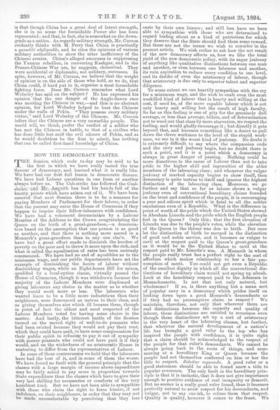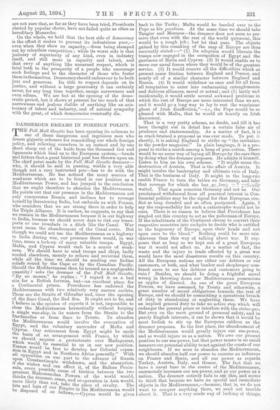HOW THE DEMOCRACY TASTES.
THE Session which ends to-day may be said to be the first in which we have really tasted the true flavour of democracy, and learned what it is really like. We have had our first full lesson in democratic finance. We have had Labour questions in one form or another always before us. The Cab-strike has followed the Coal- ariirerial& ARO...Aaquith has had his hands full of the knotty points which have arisen out of it. We have been assured that next Session there is to be a measure for paying Members of Parliament for their labour, in order that the poorest may enter the House of Commons if they happen to inspire their fellow-labourers with confidence. We have had a vehement denunciation by a Labour Member of the Address to the Crown congratulating the Queen on the birth of a great-grandson,—a denuncia- tion based on the assumption that one person is as good as another, and that there is nothing more sacred in a Monarch's great-grandson than in any one else's. We have had a great effort made to diminish the burden of poverty on the poor and to throw it more upon the rich, and what is called the equalisation of rates has been seriously commenced. We have bad no end of squabbles as to the minimum wage, and our public departments have set the example of diminishing the hours of labour without diminishing wages, while an Eight-hours Bill for mines, qualified by a local-option clause, virtually passed the House of Commons, though it was withdrawn because the majority of the Labour Members were displeased at giving labourers any choice in the matter as to whether they would work more or less. The labourers who wanted leave to be a little more industrious than their neighbours, were denounced as untrue to their class, and as giving themselves airs which ill became them, though in point of fact the oldest and most respected of the Labour Members voted for having some choice in the matter. And lastly, the bitterest battle of the Session turned on the sacred right of well-to-do peasants who Thad been evicted because they would not pay their rent, which they could have paid, to have some compensation for their public spirit in refusing to pay it out of sympathy with poorer peasants who could not have paid it if they would, and on the wickedness of an aristocratic House in venturing to differ from the representatives of Labour. In some of these controversies we hold that the labourers have had the best of it, and in some of them the worse. We have found no fault with the general principle that the classes with a large margin of income above expenditure may be fairly asked to pay more in proportion towards State expenditure than the classes which have to give their very last shilling for necessaries or comforts of the very humblest kind. But we have not been able to sympathise with those who claim the right to force leisure, if not indolence, on their neighbours, in order that they may not be made uncomfortable by perceiving that they lose caste by their own leisure ; and still less have we been able to sympathise with those who are determined to regard loafing about as a kind of patriotism for which they deserve that the State should find them some reward. But these are not the issues we wish to consider in the present article. We wish rather to ask how the net result of the new democracy affects us, how we like the total yield of the new democratic policy, with its eager jealousy of anything like qualitative distinctions between one man and another, or even between one labourer and another, its vain aspiration to reduce every condition to one level, and its dislike of even the aristocracy of labour, though that aristocracy is due only to superior talent and superior diligence.
To some extent we can heartily sympathise with the cry for a minimum wage, and the wish to exalt even the most unskilled kind of labour that is hearty and willing at the cost, if need. be, of the more capable labour which is not only hearty and willing but the result of high faculty. So far as this feeling is one of pity for the genuinely dull average, or less than average, toilers, and of determination not to weed out that class by mere starvation, we respect the feeling, and would gladly encourage it ; but directly it gets beyond that, and becomes something like a desire to pull down the clever workman to the level of the stupid work- man, we see in it the worst kind of jealousy. No doubt it is extremely difficult to say where the compassion ends and the envy and jealousy begin, but no doubt there is such a point, and it is a point which a democracy is always in great danger of passing. Nothing could be more disastrous to the cause of Labour than not to take pride in the higher skill and ingenuities of the abler members of the labouring class ; and whenever the vulgar jealousy of marked capacity begins to show itself, then democracy is quite untrue to itself and ignores the highest distinction of the labouring class. Moreover, we go further and say that so far as labour shows a vulgar jealousy even of conventional hereditary claims founded on the trust and confidence of the people, it is encouraging a poor and odious spirit which is fatal to all the nobler emulations even of a Republic. What is the difference in point of worth of the pride which the United States showed in Abraham Lincoln and the pride which the English people feel in the Queen ? Only this ; that the first elevation of Lincoln was due to the people's votes, while the elevation of the Queen to the throne was due to birth. But once let the distinction of birth be merged in the distinction of good and noble service, and it becomes as vulgar to cavil at the respect paid to the Queen's great-grandson as it would be in the United States to cavil at the respect paid to Mr. Lincoln's son. A Monarch in whom the people really trust has a perfect right to the sort of affection which makes relationship to her a fair pre- sumption of merit. You could not get even a Republic of the smallest dignity in which all the conventional dis- tinctions of hereditary claim would not spring up afresh. Look at the hereditary respect paid to the Adamses in Massachusetts. Is not that not only natural, but wholesome ? If so, is there anything but a mean sort of popular envy in a democracy which prides itself on looking down upon a good Monarch's descendants as if they had no presumptive claim to respect ? We maintain, therefore, not only that wherever there are real distinctions between the capacity and quality of labour, these distinctions are entitled to reverence even though these distinctions set up a sort of aristocracy in the very heart of the labouring classes, but further, that wherever the natural development of a nation's life has brought a good ruler to the top who has inspired the people with confidence, it is quite right that a claim should be acknowledged to the respect of the people for that ruler's descendants. We cannot be always going back to the roots of things, and mur- muring at a hereditary King or Queen because the people had not themselves conferred on him or her the title to respect. Solvitur regnando. A good ruler or a good statesman should be able to found anew a title to popular reverence. The only fault. in the hereditary prin- ciple is that it is inelastic, that it does not give importance enough to positive evidence of real incapacity or demerit. But no sooner is a really good ruler found, than it becomes perfectly natural to avow respect for his descendants, and vulgar, not to say cur-ish, to refuse them that respect. Quality is quality, however it comes to the front. We are not sure that, so far as they have been tried, Presidents elected by popular choice, have not failed quite as often as hereditary Monarchs. On the whole, we hold that the best side of democracy is the effort it makes to prevent its industrious poor,— even when they show no capacity,—from being stamped out by relentless competition ; while its worst side is that jealousy of superiority of any kind, even in industry itself, and still more in capacity and talent, and that envy of anything like unearned respect, which is fatal both to the prosperity of a people who encourage such feelings and to the character of those who foster them inthemselves. Democracy should endeavour to be both Just and generous. Its title to respect depends on its justice, and without a large generosity it can certainly never, for any long time together, escape narrowness and even odium. We are but at the opening of the demo- cratic period, but it shows at present far too much of that narrowness and jealous dislike of anything like an aris- tocracy of talent and industry, and of natural sympathy with the great, of which democracies eventuaily die.

































 Previous page
Previous page